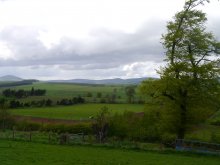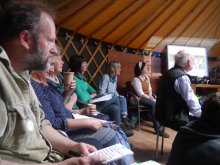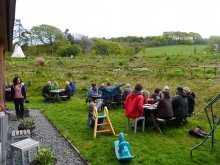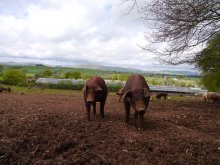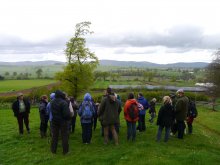By Ashley Robinson
Scotland has lots of grand and wonderful things - sweeping vistas, ancient castles, moody lochs. Scotland even has some less grand things - deep fried mars bars, indecipherable accents, dreich weather.
But, dear Scotland, I riddle you this - where are all of your CSAs? Those wonderful and innovative pairings of nourishment and community, a structure that allows for transparency and participation in our food system. They seem to be quite rare up here.
Sharing the risks, responsibilities, rewards of the farm
CSA, for the unenlightened, stands for Community Supported Agriculture - a method of organisation for growing food that shares the risks, responsibilities and rewards of farming between producer and consumer.
There are several variations on what can be considered a CSA - many operate on a CSA 'share' system. This is when consumers buy a share in a seasons' farm harvest, paying a lump sum up front at the start of the season. In return, they receive an equal share in each weeks' harvest, whether that harvest is plentiful or more limited. This spreads the inherent, and numerous, risks of farming over many people, so the farmer isn't solely saddled with risks of crop failure, weird weather, or low yields.
Other CSA models offer community involvement in growing the produce, or trade time spent working on the farm for a 'share', or are run entirely by a community group – the definition can be fairly wide, especially here in the UK.
Why make the commitment?
Why, as a consumer, would you want to commit to sharing in the farming risks, when you could just 'reap the rewards,' through a simple cash transaction at a supermarket?
Plenty of reasons. Freshness - produce is often harvested the day before, or on the day of, delivery and pick-up. Locally-grown - your money is spent locally, sustaining local economies - not some far away CEO. Transparency – knowing who grows your food, and how it is grown. Relationships – pick-ups and farm open days offer a chance to get to know your farmer, and your community. Enhancing knowledge & skills – learning how to grow through farm work days.
The most important reason to support CSAs in my mind is to do with enabling a better food system to thrive - one that values transparency, engagement, trust, and sustainability. A food system that grows food for people – not simply as a commodity cash-crop for export. A food system that works for the producer – offering a good quality of life alongside financial viability. A food system that enables opportunities for consumers to play an active role – of enquiring, understanding, learning – if they wish to. Community Supported Agriculture can be one important part of this vision of a better food system.
Farming for Community – finding the Scottish CSAs!
CSA is a model of growing and selling food that is flourishing in Canada and the USA, and is starting to pick up here in the UK too. There are numerous CSAs operating in southern England and west Wales - but what about here in Scotland?
Recently, at the "Farming for Community: Starting a CSA in Scotland" event I found some answers. Maresa Bossano, the organiser from CSA Network UK, gave us all an introduction to what CSAs are and tips of how to set up successful CSAs. Then, the floor was open to three very different Community Supported Agriculture farms right here in Scotland.
Tomnah'a Market Garden - Judith McGowan - Comrie Croft, Perthshire
Tomnah'a Market Garden is an integrated market garden, which produces a variety of veggies, eggs and cut flowers.
Tomnah'a's mission statement really says it all:
“We aim to consistently grow delicious, fresh and vibrant produce; providing for the local community through our seasonal vegetable box scheme, breath-taking cut flowers, eggs from woodland free-ranging hens, refreshing herbal teas, fruits, berries, gourmet mushrooms and more. By enriching and regenerating soil fertility we work in partnership with nature using wildlife friendly growing methods to increase biodiversity and sustainable long term productivity.”
As the CSA element at Tomnah'a is just beginning this season, they are planning to host a series of open days/ veg days, where the community can come help and learn, pick up a veg box, and donate some money. Next season, their aim is to host a thriving CSA, with regular members who pay an upfront monthly fee in return for a share of produce and access to the land.
The Field at Dunkeld - Linda Simpson - Dunkeld, Perthshire
The Field at Dunkeld is a completely community managed and run, small scale farm. Growing spinach, beetroot, garlic, peas, artichokes, flowers, potatoes, lettuces, courgettes and more on this 3 acre plot. There is a strong focus on ecological growing methods - using mulches, replacing organic matter in the soil, and increasing biodiversity.
The Field is a CSA in the sense that it was created for and by the community, it is grown and led by the community, and the community benefits from their produce.
They operate with an army of volunteers: trustees who are active in the planning process, and members who do the growing activities. Members trade work at the field for produce - the more work you do, the more veggies you take home. They also sell at weekly stalls set up in the village, and through a local shop in the colder months.
Tap'o'noth Farm - James Reid - Rhynie, Aberdeenshire
Tap'o'noth farm is an innovative, varied market farm - using permaculture design principles and agro-ecological growing methods.
Tap'o'noth sounds like a food producing paradise. With a strong focus on creating a demonstration and education site for a more regenerative way of operating a farm, they do farm tours, hold workshops, and host WWOOFers. They have a forest garden, keep Shetland cows through rotational grazing, have woodlands and coppicing, practice low till/no dig, and are beginning to branch out to CSA this season.
James describes Tap'o'noth well -
"... we strongly feel that for the benefit of our soils, water, livestock health, wildlife and community economics, there has to be a shift in the methods we use to produce our food and a resurgence of small, diverse and organic farms peppering the landscape once again. We may be small, but have a mighty attitude and hope that in some way we can inspire others to make ecologically ethical decisions within their own lives and take the leap into a more sustainable, nay, regenerative future."
Hear, hear!
Their CSA has started small and grown slowly, in order to gauge interest as they go, and raise awareness in the local community. Their aim is to have a whole farm, whole diet approach - growing as much of the CSA customers diet as they can on farm.
The next steps for Scottish CSAs
How do we encourage more CSAs in Scotland to start up, and how do we help them flourish? Big question – with a complex answer of structural, societal, and cultural changes.
The structures in our society that support small scale, that support start-ups, that support non-conventional approaches - these need to be established, promoted, and maintained. Opportunities to training and skills necessary for a CSA to succeed - such as market gardening in a challenging climate, appropriate technology, direct marketing, or community engagement- need to be prioritised too. Access to land and capital for small scale producers is also a significant barrier to entry.
The low number of CSAs in Scotland is also a cultural issue as well. We need to value our food producers, and value growing as an important career option for people both young and old. We need to prioritise good food from good sources in our budgets – recognising the integral role good food plays in the health and wellbeing of our communities and ourselves.
There are countless people and some great organisations working on providing solutions to these issues, both in Scotland (ourselves at Common Good Food, Nourish Scotland, Scottish Food Coalition) and within the UK (Sustainable Food Trust, CSA Network UK, Sustain, Landworkers Alliance, Ecological Land Co-operative).
Read, learn, engage. Support the organisations that work towards the solutions, buy from CSAs and others who host an alternative example of a better food system, and spread the word. Or, if you’re really keen, why not start a CSA yourself? I know the wheels are turning in my mind…




